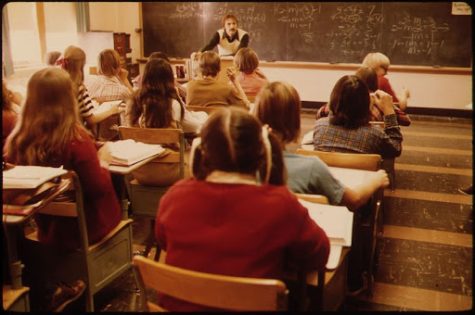The Future of Education
From low pay to outdated methods of education, here are some of the forces driving the downfall of the profession.
March 30, 2023
Since the early 1950s, the teaching profession has taken a much more inclusive, adaptive, and modern approach. However, the days of overflowing amounts of incoming teachers seem to have come to a standstill all across America. In fact, school districts in all states are currently fighting what has become known as the teacher shortage. This lack of educators at the ready has been caused by many different factors including the distribution of wealth across districts, the costs of obtaining a master/doctoral degree, frequent recertification, the stress of working with students post-COVID-19, and simply a lack of respect for the profession.
With the dire need for new educators, many states such as Utah, Mississippi, and Arkansas have taken measures through legislation to attempt to bring people back to the world of teaching. With that being said, these recent developments raise many questions as to the direction the US educational system seems to be heading. Will parents change from a public school education to a private one? Are the structures of teaching in the classroom intermingled with politics? How will we provide the profession the power for a resurgence? If you’re like me, all of these questions have likely crossed your mind. So let’s begin to unpack this controversy one step at a time.
Though the struggles many schools face began around the outbreak of the global pandemic, the struggles for teachers started much earlier than that. In an article published by National Public Radio, sources determined that problems began more simply due to the gap in the distribution of wealth in communities like Jacksonville, Mississippi. These cities had a large amount of affluent white people relocate to more desirable suburban locations over the last few decades. This left many schools, like those in Jacksonville, with severely underfunded public schools.
There is absolutely nothing wrong with relying on public schools; but with the lack of funding available in many cities to pay teachers a suitable wage, many recently graduated educators are looking for jobs in more affluent neighborhoods. This not only produces disadvantages for urban students but prevents qualified candidates from applying to work in these districts. Additionally, with the effects of COVID-19, already struggling budgets and stressed-out teachers didn’t make for a lucrative situation. During the pandemic, record numbers of teachers left the profession and had to resign simply because there was not enough support from the school districts to adapt their teaching methods.
This leads to another financial issue educators are expected to overcome; their own higher education. All teachers and educators in states like Massachusetts are required to have certain certifications, licenses, and degrees in order to teach. These requirements might vary by state, but the general need for a master’s or doctoral degree is overwhelming. In the past few years, college prices have increased to an unrealistic amount for many young people. In response to this issue, we have seen many students get their degrees from community colleges or simply not go into a profession that needs one. Unfortunately for teachers, that degree is what they need, and their low salaries in some states are just not enough to allow an average worker to pay off their student loans. So where does that leave us? Feeling nervous about the future of education I would wager. However, this could be solved by similar legislation recently passed in Utah.
As described in an article from CNN, legislation signed by Utah governor Spencer Cox would bring more funds to the education system. One way of doing so is by providing money to parents who decide they want to move their children to a private school instead of a public school. Using a left-over amount of state money, the bill allows parents to receive a few thousand dollars for their child’s education to help pay for tuition, books, supplies, etc. However, the bill also adds a large amount of money to public school teachers’ pay. Salaries in low-paying public schools could see pay raises of up to $14,000 a year. The bill also provides state funding to public schools as a form of compensation for the children they lose to private schools, in order to combat the weakening of their already delicate systems. This new idea has been favored by many representatives across the aisle advocating for change within a school system and might be a good first step to bringing light back into the profession. With more money to spend to make teachers’ salaries more livable and the curriculum more accessible, the tensions between teachers and minority areas might start to decrease in intensity.
There is of course one more obstacle that seems to be tugging on the sleeves of educators alike across the country that no amount of money can fix. There seems to be a lack of respect for the work teachers do. Recently many teachers have experienced difficult situations involving politics that have interfered with the subjects they can teach in the classroom. This wave of the “parental rights” movement has put many teachers in awkward situations, not knowing the legal boundaries of teaching certain books, histories, and ideas. To some, this seems like an insulting punch to the gut. The idea that the government is regulating what they are teaching in the classroom completely undermines the value of the education teachers themselves went through in order to acquire their jobs. This conflict is leaving educators deflated that they are not being trusted to teach professionally approved topics and lessons they spent their careers developing.

The factors that have led to the crisis we now face in public education today certainly call for some kind of reboot. Regardless of the efforts to work across the aisle in Congress, many lawmakers must develop new laws to make up for the lost time. Future solutions to the pressing problems in education may be uncertain to lawmakers, but the desire for change is quickly sweeping the nation. I would even go as far as to say that perhaps the current students of Minnechaug will be the last generation to see education as it is today before it is revamped by policymakers who demand improved outcomes for all of our nation’s children.



Evelyn • Apr 14, 2023 at 8:46 am
Super interesting! This answered a lot of my questions about the causes of the teacher shortage, and looked at it from a lot of different angles.